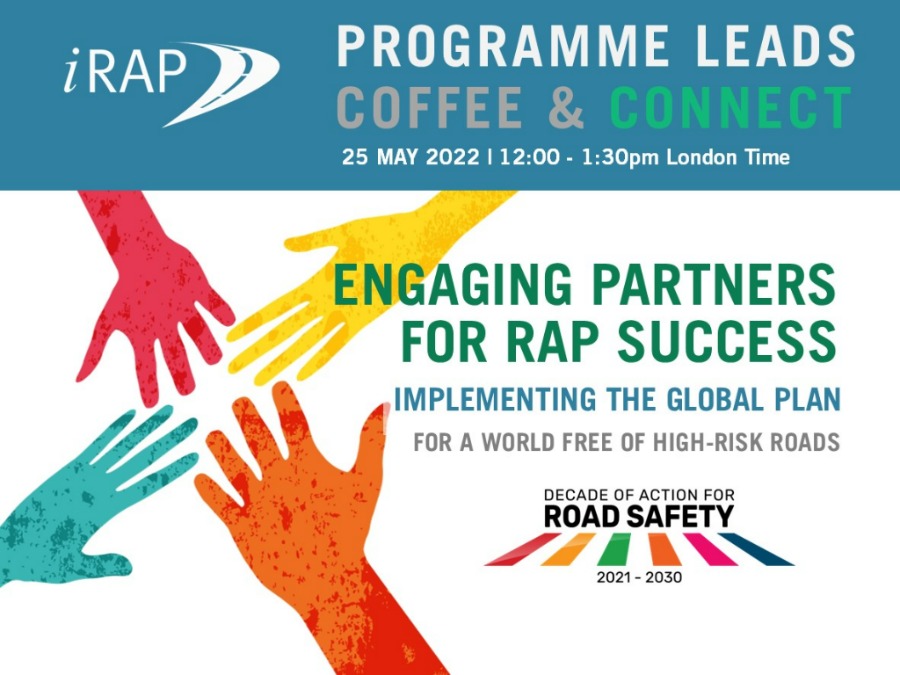More than 230 leads of national road assessment programmes (RAPs) in 46 countries registered for Coffee and Connect delivered in English and Spanish this month to learn about the key elements and partners that make up an effective RAP ‘ecosystem’ and tips for engaging them for success.
The session included presentations on:
- A Quick Trip Around the World: Global and National News – Judy Williams Global Programme and Communications Manager, iRAP
- An Update on iRAP Initiatives – Greg Smith Global Programme Director, iRAP
- What exactly is a RAP, how can you form one and who should be involved? – Greg Smith
- Bringing Partners Together for a Common Cause – Valeria Motta, Advocacy and Partnerships Director, Global Alliance of NGOs for Road Safety
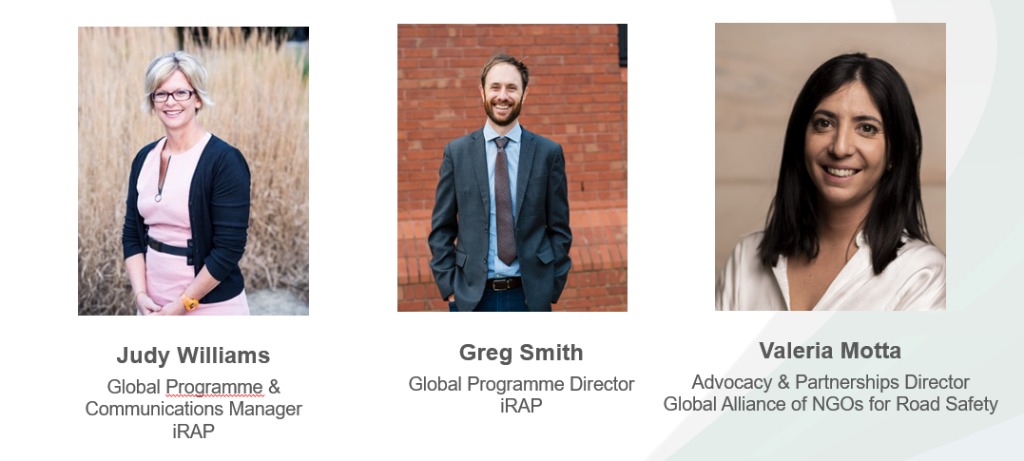
Greg said that road assessment programmes can come in many sizes and forms but tend to include 4 common characteristics:
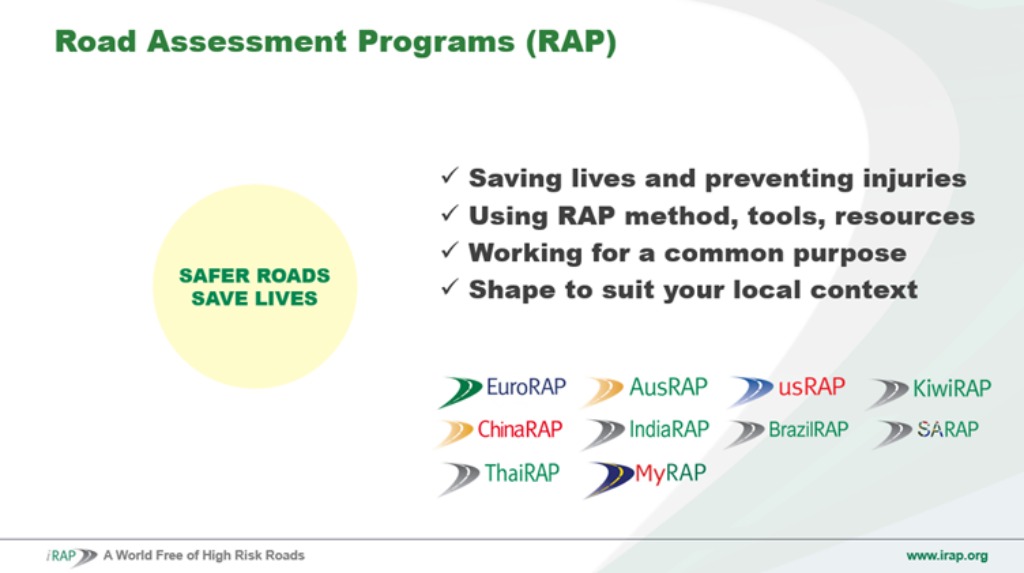
An effective programme doesn’t necessarily require a formal RAP entity but all use the iRAP methodology and tools (complemented by others) and include a focus on up to 7 key elements – programme leadership, assessments, policy, capacity building, investment, implementation and oversight, communications and advocacy, and measurement of success. This is supported by an ‘ecosystem’ of partners each with important and complementary roles.
“No one person can do it all,” Greg said.
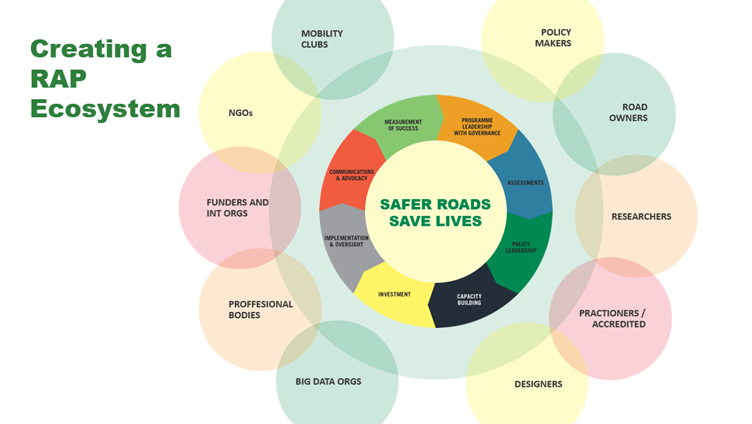
The 7 key elements for a RAP programme and important ecosystem of partners that should be involved
Valeria, who coordinates campaigns and policy activities for 302 member NGOs in 100 countries, said NGOs are important and needed advocates for road safety, often effective in catalyzing political will.
She recommended establishing common ground with all partners based on the 17 Sustainable Development Goals not just those focussed on health and infrastructure. Climate, gender, education and partnerships are all related and influential agendas for collaboration to reduce road trauma.
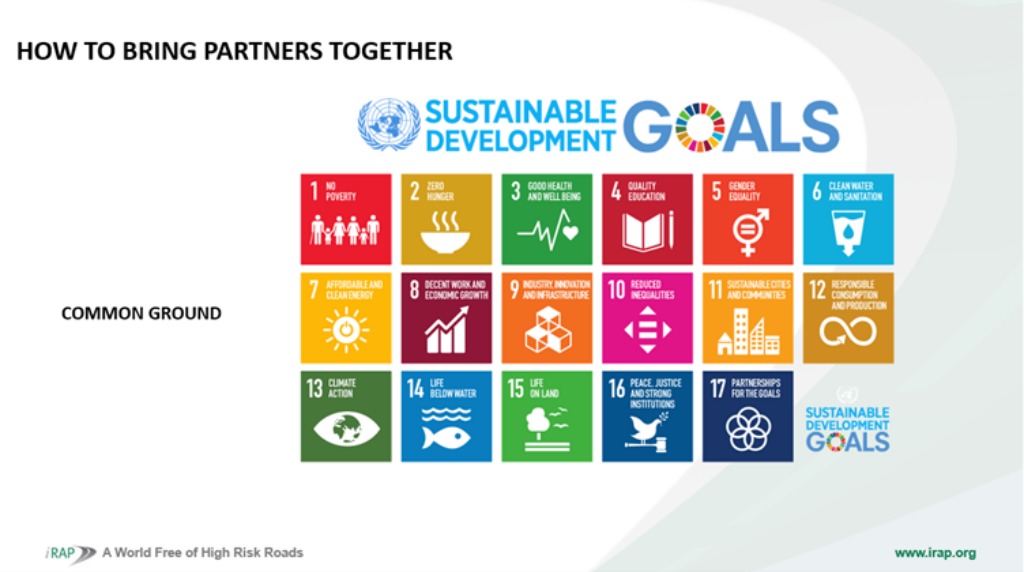
“With resource limitations, it’s valuable to prioritise partners and your efforts to those of High Importance/High Influence,” Valeria said:
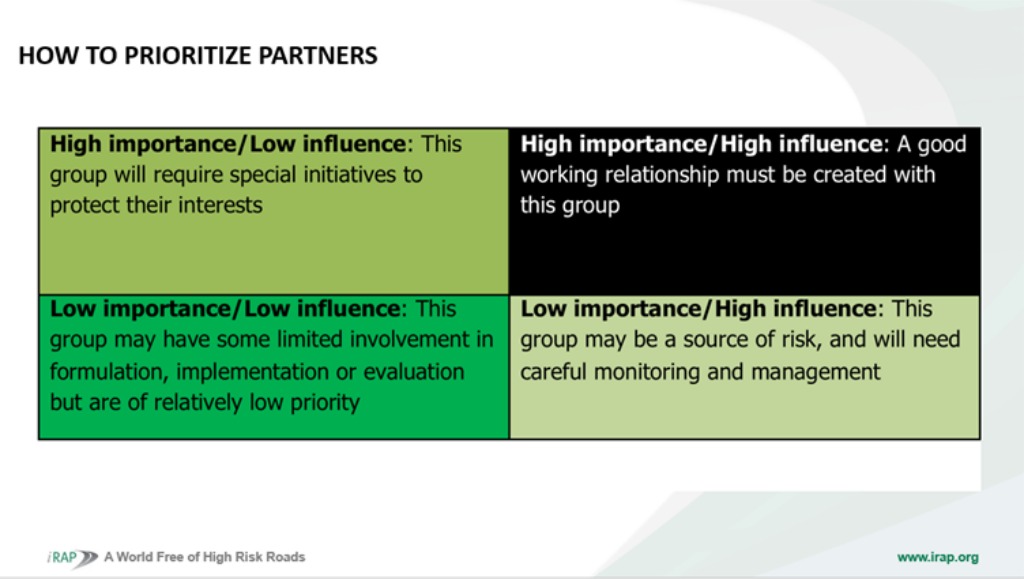
Judy shared a range of exciting global and national news highlights including:
- 22 national and state road safety strategies are now published with RAP metrics as targets for safer road infrastructure. These include Vietnam, Indonesia, Croatia, Brazil, Saudi Arabia, China, Greece, New Zealand, Australia, Thailand, Malaysia and Slovenia. In addition, Abertis has set Star Rating safety commitments for their toll roads in 15 countries. In combination, the strategies have a safety impact in 70 countries. Many development banks have also set star rating targets in their projects.
- iRAP’s Where We Work map has been enhanced to include more iRAP metrics, policy and links out to national Vaccines for Roads injury and Business Case data for each country. It’s a valuable resource for seeing what’s happening in countries and to connect with RAP leads.
- NGOs have met with Ministers in 36 countries to hand over the Global Plan and encourage them to implement it in national strategies. The Global Alliance of NGOs Commit to Act campaign ran last week and called for government decision makers to make specific, measurable road safety commitments and to put those commitments into action. 123 commitments are registered on the Alliance’s global commitment tracker.
- The International Transport Forum brought together Transport ministers and road safety stakeholders of 63 member countries last week to look at how we make transport inclusive for societies, and in particular how to achieve this on scale in policy.
- The first ever UN High-Level Meeting on Global Road Safety will occur from 30 June to 1 July in New York and bring together heads of state (prime ministers and presidents) to discuss how to halve road deaths and injuries by 2030. iRAP’s letters to the Heads of State in countries via the UN Permanent Missions encouraging their participation and implementation of the Global Plan have been well-received and around 50 countries have utilised the letter in their own local advocacy meetings with Ministers. iRAP is supporting countries who wish to participate.
- The UN Road Safety Fund is calling for proposals by 30 June. The Fund disbursed a total of US$ 4 million in the last Call. Priorities include technical assistance to identify gaps and improve national plans and to implement specific actions to improve national road safety and its management.
- Brazil’s National Department of Transport Infrastructure (DNIT) has been awarded an iRAP 5-star Performer Award recognizing its exceptional leadership in developing BrazilRAP.
- In the Dominican Republic, the Inter-American Development Bank has funded an 1,100km iRAP assessment.
- EuroRAP has been running a lunchtime seminar series for knowledge sharing. All are welcome to attend. Also in Europe, Projects RADAR and SLAIN have come to an attend. These were both multinational projects involving 12 and 4 Danube countries respectively. Project SABRINA is also underway in 11 Danube countries and aims to tackle cycling infrastructure safety issues across the region. There’s lots of great multi-country impact in Europe with these projects.
- The Millennium Challenge Corporation has funded the Star Rating of 50km of Designs for an Egis project in Cote d’Ivoire.
- TanRAP is launching next month. Tanzania is the first country to implement the 10 Step Plan for Safer Road Infrastructure and we look forward to celebrating this milestone with local partners.
- MoroRAP for Morocco is developing supported by the National Road Safety Agency and General Department of Roads.
- The Department of Roads has recently completed a World Bank-funded 1,500 km assessment on high-risk national highways in Nepal.
- In Pakistan, the assessment of 15,570 kms of the National Highway network is complete.
- A new national road safety agency has launched in Senegal.
- In the United States, a Winnebago Tribe project has kick-offed in Nebraska and a safe system coding comparison report is being developed to be released the TRB conference in January.
- ThaiRAP was awarded the Prime Minister’s Award for Road Safety at today’s National Road Safety Conference.
Coffee and Connect is an important forum for capacity building and mentorship as national RAPs develop their strategies and action plans for the Second Decade of Action to halve global road deaths and injuries by 2030.
iRAP is the global umbrella organisation for regional and national RAPs including EuroRAP, BrazilRAP, IndiaRAP, MyRAP, ThaiRAP, ChinaRAP, AusRAP, KiwiRAP, usRAP and SARAP.
Working in partnership programmes are #StrongerTogether.
If you’d like to join future Coffee and Connect sessions, please contact judy.williams@irap.org


